Unit 12 What did you do last weekend?单元复习课件 (共27张PPT)
文档属性
| 名称 | Unit 12 What did you do last weekend?单元复习课件 (共27张PPT) | 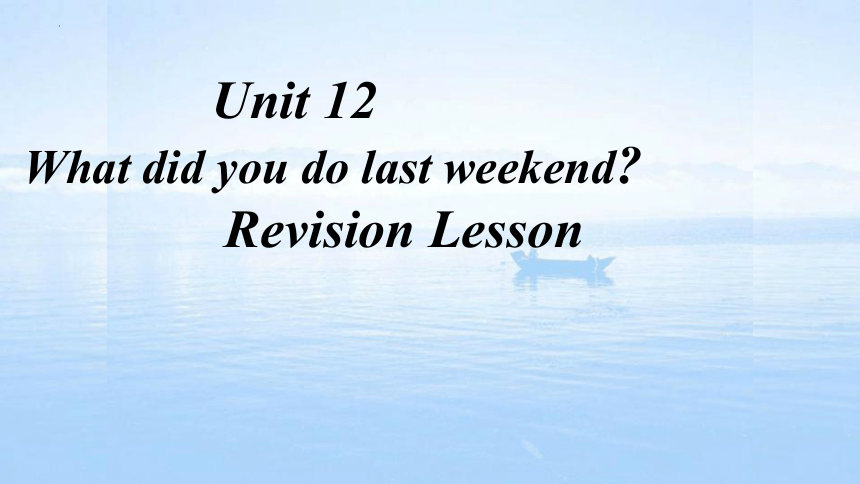 | |
| 格式 | pptx | ||
| 文件大小 | 1.3MB | ||
| 资源类型 | 教案 | ||
| 版本资源 | 人教新目标(Go for it)版 | ||
| 科目 | 英语 | ||
| 更新时间 | 2022-06-14 07:17:40 | ||
图片预览


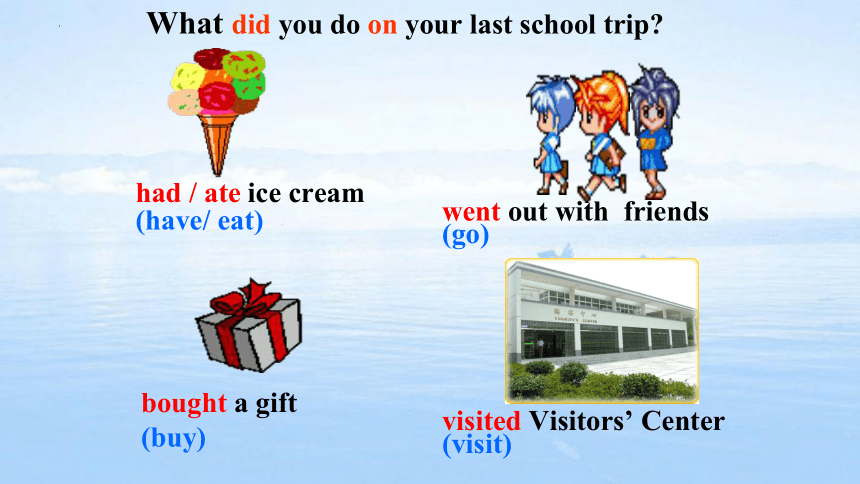
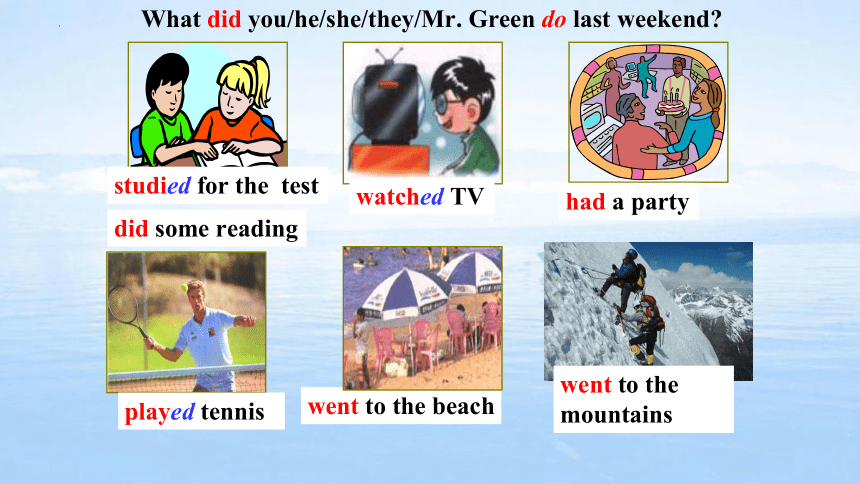

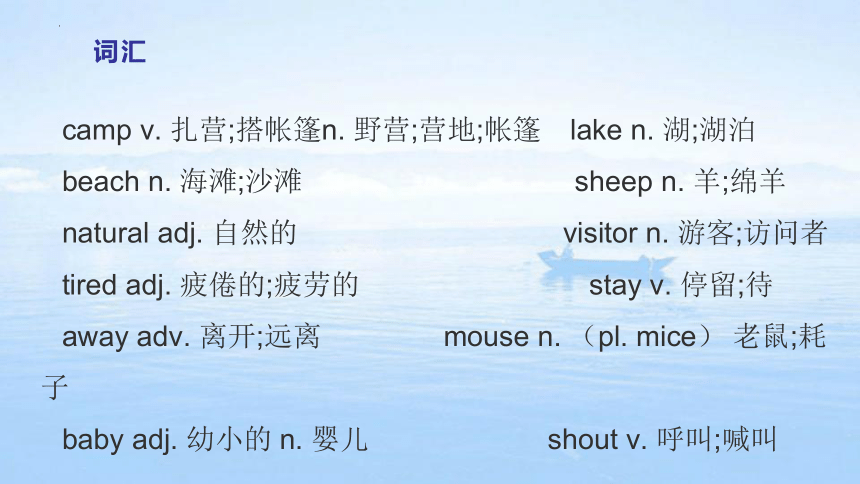
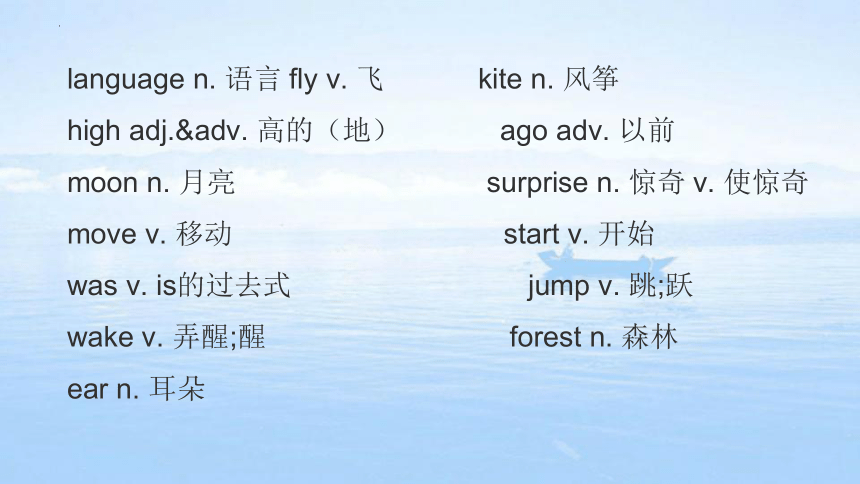
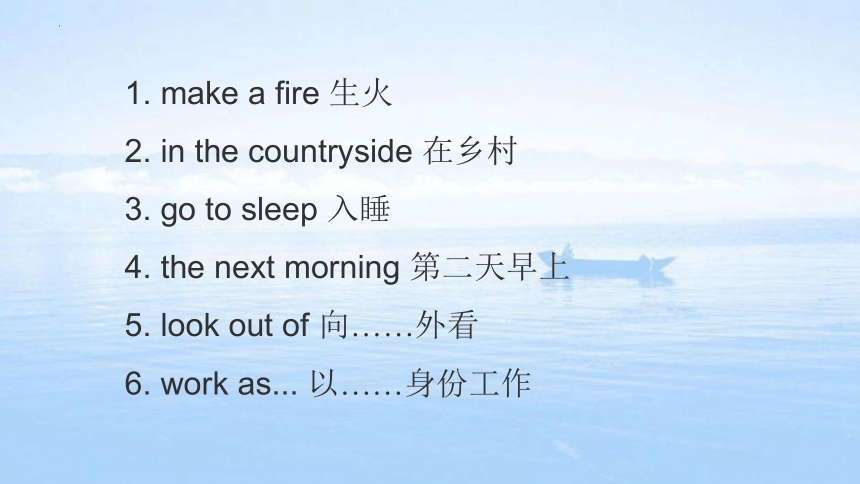
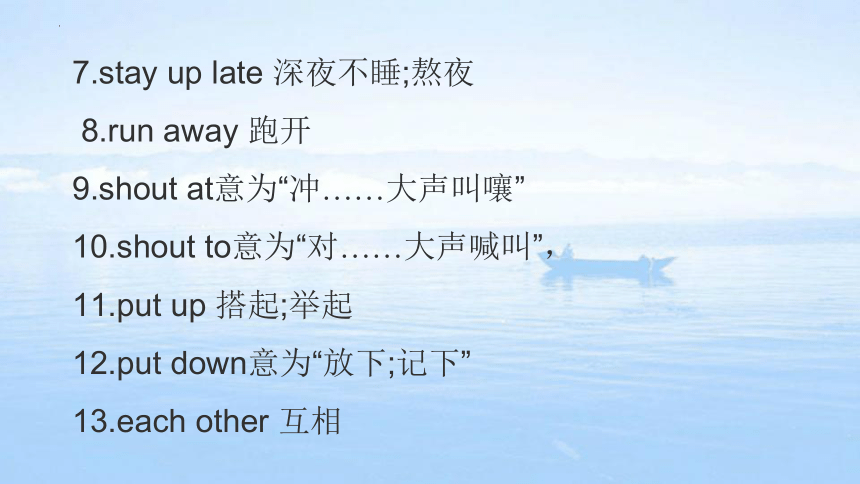
文档简介
(共27张PPT)
Unit 12
What did you do last weekend
Revision Lesson
What did you do last weekend
watch TV
listen to music
play soccer
go
swimming
ed
ed
(went)
ed
bought a gift
(buy)
had / ate ice cream
(have/ eat)
went out with friends
(go)
What did you do on your last school trip
visited Visitors’ Center
(visit)
What did you/he/she/they/Mr. Green do last weekend
studied for the test
watched TV
had a party
played tennis
went to the beach
did some reading
went to the mountains
A: Where did he go
last Sunday
B: He stayed at home.
B: They went to a farm.
A: Where did they go
last Sunday
camp v. 扎营;搭帐篷n. 野营;营地;帐篷 lake n. 湖;湖泊
beach n. 海滩;沙滩 sheep n. 羊;绵羊
natural adj. 自然的 visitor n. 游客;访问者
tired adj. 疲倦的;疲劳的 stay v. 停留;待
away adv. 离开;远离 mouse n. (pl. mice) 老鼠;耗子
baby adj. 幼小的 n. 婴儿 shout v. 呼叫;喊叫
词汇
language n. 语言 fly v. 飞 kite n. 风筝
high adj.&adv. 高的(地) ago adv. 以前
moon n. 月亮 surprise n. 惊奇 v. 使惊奇
move v. 移动 start v. 开始
was v. is的过去式 jump v. 跳;跃
wake v. 弄醒;醒 forest n. 森林
ear n. 耳朵
1. make a fire 生火
2. in the countryside 在乡村
3. go to sleep 入睡
4. the next morning 第二天早上
5. look out of 向……外看
6. work as... 以……身份工作
7.stay up late 深夜不睡;熬夜
8.run away 跑开
9.shout at意为“冲……大声叫嚷”
10.shout to意为“对……大声喊叫”,
11.put up 搭起;举起
12.put down意为“放下;记下”
13.each other 互相
重点难点分析
1.In the morning, I camped by the lake with my classmates. 上午我和同学们一起去湖边野营了。
句中camp既可作名词,意为“野营;营地;帐篷”;又可作动词,意为“扎营;搭帐篷”。
例如:
①At the summer camp, we had a good time. 在夏令营,我们玩得很开心。
②We went camping last Sunday. 上周日我们去野营了。
2.. It was important not to go near a snake. 重要的是不要靠近蛇。
It is + 形容词 + to do... 是英语中一个重要的句型。能够这样用的形容词除了important外, 我们学过的还有easy, difficult, hard等。表示“做某事是容易(困难)的”。如:
It is difficult for me to study English. 对我来说学英语很难。
It is easy for me to get up early. 对我来说早起很容易。
3. How interesting! 多么有趣啊!
感叹句结构:
①How + 形容词或副词 + (主语 + 谓语)!
②What +(a/an)+ adj.+ 名词+(主语 + 谓语)!
How interesting the book is!那本书太有趣了!
What an interesting book it is!
4. I told the visitors about them and their living habits.
我把这些蝴蝶以及它们的生活习性告诉给参观者。
1) visit v. visitor n. visit +sb.看望某人 visit +sp.游览/参观某地
He is an English visitor.
I visited my aunt last weekend.
2) tell v.
tell sb. about sth. 告诉某人关于某事
tell sb. sth. 告诉某人某事
tell sth. to sb.把某事告诉某人
tell sb.(not) to do sth. 告诉某人(不要)做某事
5. Did you do anything interesting last weekend
上周末你做什么有趣的事情了吗?
形容词修饰something, anything, nothing等不定代词时,要放在这些不定代词的后面。
Come here! I have something important to tell you.
过来!我有一些重要的事要告诉你。
6. take 带领 take sb. to +地点则表示“带领某人去某处”
On Sundays, the father would take his son to the park.
一到星期天,爸爸便会带他的儿子去公园。
bring 意为“拿来,带来”,表示“拿到靠说话人近的地方”。
take 意为“拿走,带走”,表示“拿到远离说话人远的地方”。
carry 意为“扛,搬”,用力移动,没有方向性。
fetch 意为“去取,去拿”表示往返拿物。
7. I was so tired that I went to sleep early.
我太疲劳了,以至于早早就睡觉了。
“so + 形容词 + that句子 ”,意为 “如此……以至于”
I was so scared that I couldn’t move. 我是那么害怕,一动都不敢动。
“so…that”可以和“too…to…”句式结构互换同义句。
too + adj. + to+ v.
Paul is so lazy that he doesn’t go to work.
Paul is to lazy to go to work.
一般过去时用来表示过去某一时间或某一段时间内发生的动作或存在的状态以及过去经常反复发生的动作;
基本结构:主语+动词过去式+其他;
常和表示过去的时间状语连用,
如yesterday昨天、last night昨晚、last week上周、
last year去年,two years ago两年以前,in+过去的年代
也常和often经常,always总是,once a week一周一次,
等表示频度的时间状语连用。
一般过去时
一、 一般过去时的概念
1. Be动词的一般过去时
肯定句式:主语 + was / were + 其它.
否定句式:主语 + wasn’t /weren’t+ 其它.
一般疑问句:Was/Were + 主语 + 其它?
肯定回答:Yes,主语+ was / were .
否定回答:No,主语+ wasn’t /weren’t.
2. 行为动词(v.)的一般过去时态
肯定句式:主语 + v-ed+ 其它.
否定句式:主语 + didn’t + v原形+ 其它.
一般疑问句:Did + 主语+ v.原形+ 其它?
肯定回答:Yes,主语+did.
否定回答:No,主语+did’t.
wasn’t
=was not
weren’t
=were not
【did not = didn’t】
【do , does---did】
am/is ---was are---were
二、一般过去时的结构
注意:1. did和didn’t 是构成一般过去时的助动词,
其特点是要在其后跟动词的原形。
2. 实意动词do的一般过去时
I do my homework every day.(用yesterday改写句子)
I ____my homework yesterday.
I _________ my homework yesterday.(否定句)
____ you ____ your homework yesterday?
Yes ,I did. /No, I didn’t.(一般疑问句)
They ______ (have) a good time yesterday.
They ___________ (not watch) TV last night.
____ you _____ (go) to the park yesterday
Yes, I____. / _____, I didn’t.
had
didn’t watch
Did
go
did
No
did
didn’t do
Did
do
1. 规则动词的过去式
1) 一般情况下,在动词原形后面加-ed。
2)以不发音e结尾的动词,在词尾直接加-d。
3)以“辅音字母+ y”结尾的动词,先将 y 改为i ,再加 –ed。
4)以重读闭音节(即辅音+元音+辅音)末尾只有一个
辅音字母的动词,要先双写这个辅音字母后,再加 –ed。
四、动词过去式的构成
look
watch
start
visit
pull
looked
watched
started
visited
pulled
cook
live
use
taste
study
cooked
lived
used
tasted
studied
try
play
stop
plan
tried
played
stopped
planned
2.不规则动词的过去式需特殊记忆。
am(is) are(是)
can(能) do/does(做,干)
have (has)(有) go(走)
come(来) feed (喂)
buy (买) eat(吃)
grow(生长) ride (骑)
run(跑) say (说)
see (看见) get(变得,到达)
teach(教) take(带)
swim(游泳) learn(学习)
was
could
had
came
bought
grew
ran
saw
taught
swam
were
did
went
fed
ate
rode
said
got
took
learned
learnt
did … homework
a little difficult
helped my mother cook dinner
went to the library
read a book about …
played soccer with…
watched TV
saw … talk show
Saturday
cleaned …
morning
morning
Sunday
afternoon
afternoon
night
night
I had a busy weekend.
My busy weekend
I had a busy weekend.
On Saturday morning, I .... In the afternoon, I …. On Saturday night, ….
On Sunday morning, I …. In the afternoon, I …. On Sunday night, I … .
All in all, it was a … weekend.
talk showtalk show
1. We ______ (live) in Japan last year.
2. Jack ________ (stop) the car last Sunday.
3. Tom _______ (clean) my room and _______(study)
for the Chinese test last weekend.
4. What ______ you ______(do) last night
5. On Sunday morning I _________(play) tennis.
lived
stopped
cleaned
studied
did
do
played
Exercise. 用所给动词的适当形式填空
根据意思填空
1. How ___ your school trip It was great.
2. How _____ you yesterday
3. Today is Monday. Yesterday ___ Sunday.
4. What ___ you do the day before yesterday
____ you ride a horse last week
6. ____ he see any cows on the farm Yes, he did.
7. Did he milk a cow on the farm No, he ______.
8. Were the strawberries good Yes, they _______.
9. Did you see any cows Yes, I did. I ___ quite a lot.
10. I ___ the chickens last week.
was
were
was
did
Did
Did
didn’t
were
saw
fed
PRACTICE
改写句子:
1、Lucy did her homework at home.(改否定句)
Lucy _______ _______ her homework at home.
2、He found some meat in the fridge.(变一般疑问句)
______ he _____ ______ meat in the fridge
3、She stayed there last week.(对划线部分提问)
______ ______ she _____ there
4、There was some orange in the cup.(变一般疑问句)
_____ there _____ orange in the cup
didn’t do
Did find any
When did stay
Was any
Thank you!Thank you!
Unit 12
What did you do last weekend
Revision Lesson
What did you do last weekend
watch TV
listen to music
play soccer
go
swimming
ed
ed
(went)
ed
bought a gift
(buy)
had / ate ice cream
(have/ eat)
went out with friends
(go)
What did you do on your last school trip
visited Visitors’ Center
(visit)
What did you/he/she/they/Mr. Green do last weekend
studied for the test
watched TV
had a party
played tennis
went to the beach
did some reading
went to the mountains
A: Where did he go
last Sunday
B: He stayed at home.
B: They went to a farm.
A: Where did they go
last Sunday
camp v. 扎营;搭帐篷n. 野营;营地;帐篷 lake n. 湖;湖泊
beach n. 海滩;沙滩 sheep n. 羊;绵羊
natural adj. 自然的 visitor n. 游客;访问者
tired adj. 疲倦的;疲劳的 stay v. 停留;待
away adv. 离开;远离 mouse n. (pl. mice) 老鼠;耗子
baby adj. 幼小的 n. 婴儿 shout v. 呼叫;喊叫
词汇
language n. 语言 fly v. 飞 kite n. 风筝
high adj.&adv. 高的(地) ago adv. 以前
moon n. 月亮 surprise n. 惊奇 v. 使惊奇
move v. 移动 start v. 开始
was v. is的过去式 jump v. 跳;跃
wake v. 弄醒;醒 forest n. 森林
ear n. 耳朵
1. make a fire 生火
2. in the countryside 在乡村
3. go to sleep 入睡
4. the next morning 第二天早上
5. look out of 向……外看
6. work as... 以……身份工作
7.stay up late 深夜不睡;熬夜
8.run away 跑开
9.shout at意为“冲……大声叫嚷”
10.shout to意为“对……大声喊叫”,
11.put up 搭起;举起
12.put down意为“放下;记下”
13.each other 互相
重点难点分析
1.In the morning, I camped by the lake with my classmates. 上午我和同学们一起去湖边野营了。
句中camp既可作名词,意为“野营;营地;帐篷”;又可作动词,意为“扎营;搭帐篷”。
例如:
①At the summer camp, we had a good time. 在夏令营,我们玩得很开心。
②We went camping last Sunday. 上周日我们去野营了。
2.. It was important not to go near a snake. 重要的是不要靠近蛇。
It is + 形容词 + to do... 是英语中一个重要的句型。能够这样用的形容词除了important外, 我们学过的还有easy, difficult, hard等。表示“做某事是容易(困难)的”。如:
It is difficult for me to study English. 对我来说学英语很难。
It is easy for me to get up early. 对我来说早起很容易。
3. How interesting! 多么有趣啊!
感叹句结构:
①How + 形容词或副词 + (主语 + 谓语)!
②What +(a/an)+ adj.+ 名词+(主语 + 谓语)!
How interesting the book is!那本书太有趣了!
What an interesting book it is!
4. I told the visitors about them and their living habits.
我把这些蝴蝶以及它们的生活习性告诉给参观者。
1) visit v. visitor n. visit +sb.看望某人 visit +sp.游览/参观某地
He is an English visitor.
I visited my aunt last weekend.
2) tell v.
tell sb. about sth. 告诉某人关于某事
tell sb. sth. 告诉某人某事
tell sth. to sb.把某事告诉某人
tell sb.(not) to do sth. 告诉某人(不要)做某事
5. Did you do anything interesting last weekend
上周末你做什么有趣的事情了吗?
形容词修饰something, anything, nothing等不定代词时,要放在这些不定代词的后面。
Come here! I have something important to tell you.
过来!我有一些重要的事要告诉你。
6. take 带领 take sb. to +地点则表示“带领某人去某处”
On Sundays, the father would take his son to the park.
一到星期天,爸爸便会带他的儿子去公园。
bring 意为“拿来,带来”,表示“拿到靠说话人近的地方”。
take 意为“拿走,带走”,表示“拿到远离说话人远的地方”。
carry 意为“扛,搬”,用力移动,没有方向性。
fetch 意为“去取,去拿”表示往返拿物。
7. I was so tired that I went to sleep early.
我太疲劳了,以至于早早就睡觉了。
“so + 形容词 + that句子 ”,意为 “如此……以至于”
I was so scared that I couldn’t move. 我是那么害怕,一动都不敢动。
“so…that”可以和“too…to…”句式结构互换同义句。
too + adj. + to+ v.
Paul is so lazy that he doesn’t go to work.
Paul is to lazy to go to work.
一般过去时用来表示过去某一时间或某一段时间内发生的动作或存在的状态以及过去经常反复发生的动作;
基本结构:主语+动词过去式+其他;
常和表示过去的时间状语连用,
如yesterday昨天、last night昨晚、last week上周、
last year去年,two years ago两年以前,in+过去的年代
也常和often经常,always总是,once a week一周一次,
等表示频度的时间状语连用。
一般过去时
一、 一般过去时的概念
1. Be动词的一般过去时
肯定句式:主语 + was / were + 其它.
否定句式:主语 + wasn’t /weren’t+ 其它.
一般疑问句:Was/Were + 主语 + 其它?
肯定回答:Yes,主语+ was / were .
否定回答:No,主语+ wasn’t /weren’t.
2. 行为动词(v.)的一般过去时态
肯定句式:主语 + v-ed+ 其它.
否定句式:主语 + didn’t + v原形+ 其它.
一般疑问句:Did + 主语+ v.原形+ 其它?
肯定回答:Yes,主语+did.
否定回答:No,主语+did’t.
wasn’t
=was not
weren’t
=were not
【did not = didn’t】
【do , does---did】
am/is ---was are---were
二、一般过去时的结构
注意:1. did和didn’t 是构成一般过去时的助动词,
其特点是要在其后跟动词的原形。
2. 实意动词do的一般过去时
I do my homework every day.(用yesterday改写句子)
I ____my homework yesterday.
I _________ my homework yesterday.(否定句)
____ you ____ your homework yesterday?
Yes ,I did. /No, I didn’t.(一般疑问句)
They ______ (have) a good time yesterday.
They ___________ (not watch) TV last night.
____ you _____ (go) to the park yesterday
Yes, I____. / _____, I didn’t.
had
didn’t watch
Did
go
did
No
did
didn’t do
Did
do
1. 规则动词的过去式
1) 一般情况下,在动词原形后面加-ed。
2)以不发音e结尾的动词,在词尾直接加-d。
3)以“辅音字母+ y”结尾的动词,先将 y 改为i ,再加 –ed。
4)以重读闭音节(即辅音+元音+辅音)末尾只有一个
辅音字母的动词,要先双写这个辅音字母后,再加 –ed。
四、动词过去式的构成
look
watch
start
visit
pull
looked
watched
started
visited
pulled
cook
live
use
taste
study
cooked
lived
used
tasted
studied
try
play
stop
plan
tried
played
stopped
planned
2.不规则动词的过去式需特殊记忆。
am(is) are(是)
can(能) do/does(做,干)
have (has)(有) go(走)
come(来) feed (喂)
buy (买) eat(吃)
grow(生长) ride (骑)
run(跑) say (说)
see (看见) get(变得,到达)
teach(教) take(带)
swim(游泳) learn(学习)
was
could
had
came
bought
grew
ran
saw
taught
swam
were
did
went
fed
ate
rode
said
got
took
learned
learnt
did … homework
a little difficult
helped my mother cook dinner
went to the library
read a book about …
played soccer with…
watched TV
saw … talk show
Saturday
cleaned …
morning
morning
Sunday
afternoon
afternoon
night
night
I had a busy weekend.
My busy weekend
I had a busy weekend.
On Saturday morning, I .... In the afternoon, I …. On Saturday night, ….
On Sunday morning, I …. In the afternoon, I …. On Sunday night, I … .
All in all, it was a … weekend.
talk showtalk show
1. We ______ (live) in Japan last year.
2. Jack ________ (stop) the car last Sunday.
3. Tom _______ (clean) my room and _______(study)
for the Chinese test last weekend.
4. What ______ you ______(do) last night
5. On Sunday morning I _________(play) tennis.
lived
stopped
cleaned
studied
did
do
played
Exercise. 用所给动词的适当形式填空
根据意思填空
1. How ___ your school trip It was great.
2. How _____ you yesterday
3. Today is Monday. Yesterday ___ Sunday.
4. What ___ you do the day before yesterday
____ you ride a horse last week
6. ____ he see any cows on the farm Yes, he did.
7. Did he milk a cow on the farm No, he ______.
8. Were the strawberries good Yes, they _______.
9. Did you see any cows Yes, I did. I ___ quite a lot.
10. I ___ the chickens last week.
was
were
was
did
Did
Did
didn’t
were
saw
fed
PRACTICE
改写句子:
1、Lucy did her homework at home.(改否定句)
Lucy _______ _______ her homework at home.
2、He found some meat in the fridge.(变一般疑问句)
______ he _____ ______ meat in the fridge
3、She stayed there last week.(对划线部分提问)
______ ______ she _____ there
4、There was some orange in the cup.(变一般疑问句)
_____ there _____ orange in the cup
didn’t do
Did find any
When did stay
Was any
Thank you!Thank you!
同课章节目录
- Unit 1 Can you play the guitar?
- Section A
- Section B
- Unit 2 What time do you go to school?
- Section A
- Section B
- Unit 3 How do you get to school?
- Section A
- Section B
- Unit 4 Don't eat in class.
- Section A
- Section B
- Unit 5 Why do you like pandas?
- Section A
- Section B
- Unit 6 I'm watching TV.
- Section A
- Section B
- Review of Units 1-6
- Unit 7 It's raining!
- Section A
- Section B
- Unit 8 Is there a post office near here?
- Section A
- Section B
- Unit 9 What does he look like?
- Section A
- Section B
- Unit 10 I'd like some noodles.
- Section A
- Section B
- Unit 11 How was your school trip?
- Section A
- Section B
- Unit 12 What did you do last weekend?
- Section A
- Section B
